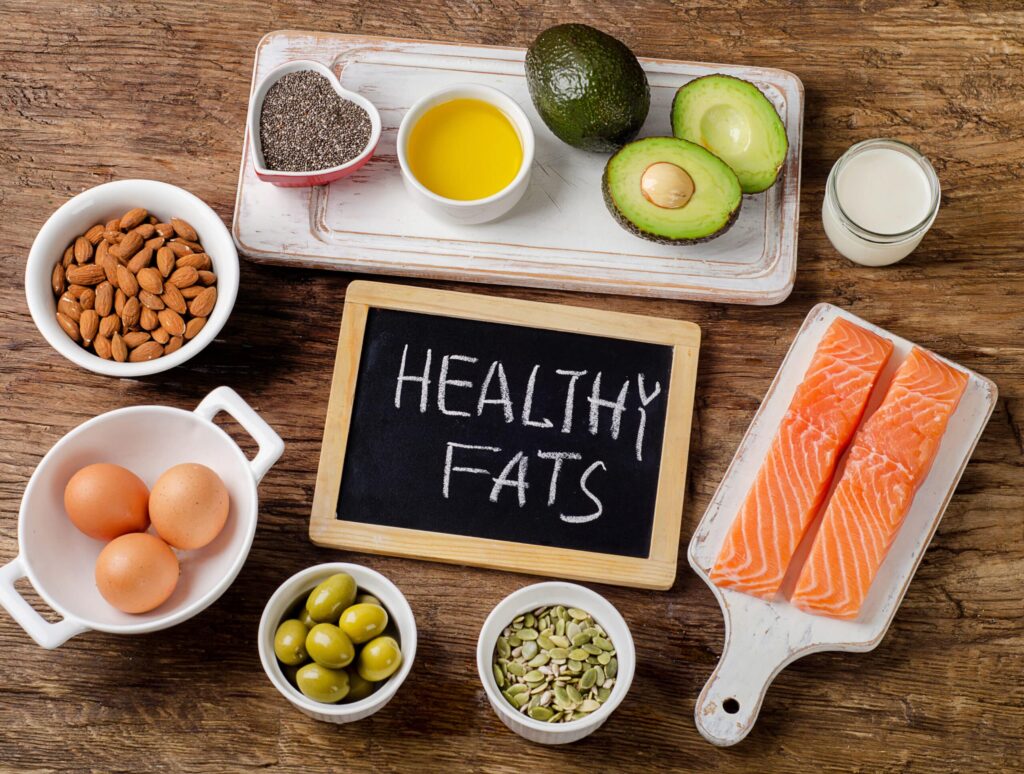
Fats, also referred to as lipids, are one of the three macronutrients, alongside carbohydrates and proteins.
They play a crucial role in human health and nutrition, serving various functions that are essential for maintaining overall well-being. In this article, we will explore the different types of fat, their functions in the body, sources of dietary fats, and their health implications.
Types of Fats
- Saturated Fats:
Saturated fats are typically solid at room temperature and are primarily found in animal products, such as meat, butter, and dairy, as well as some plant oils, like coconut oil and palm oil. Chemically, saturated fats have no double bonds between carbon atoms, which means they are saturated with hydrogen atoms. While they can contribute to an increase in cholesterol levels, the effects may vary depending on the overall diet. - Unsaturated Fats:
Unsaturated fats can be further divided into two categories:
- Monounsaturated Fats: These lipids contain one double bond in their chemical structure and are considered heart-healthy. They are primarily found in olive oil, avocados, and nuts. Eating foods rich in monounsaturated fats may help reduce bad cholesterol levels.
- Polyunsaturated Fats: These lipids contain multiple double bonds and are further categorized into omega-3 and omega-6 fatty acids. Omega-3 fatty acids are essential fats that the body cannot produce and are found in fatty fish (like salmon and mackerel), flaxseeds, and walnuts. Omega-6 fatty acids are more prevalent in vegetable oils and processed foods. Both types play vital roles in brain function and cellular health.
3. Trans Fats:
Trans fat are artificially created through a process called hydrogenation, which adds hydrogen to liquid oils to make them solid, improving shelf life and flavor.
They are mostly found in processed foods, such as baked goods, snacks, and margarine.
Trans fat are harmful because they raise bad cholesterol (LDL) levels while lowering good cholesterol (HDL) levels, leading to an increased risk of heart disease.
If you are interested in learning more about nutrition and all the essential information related to it, you have come to the right place.
So, take your time and immerse yourself in the wealth of knowledge available on nutrition here!
Functions of Fats in the Body
Lipids are fundamental to several physiological functions, including:
- Energy Source: Lipids serve as a concentrated source of energy, providing 9 calories per gram, which is more than double that of carbohydrates and proteins. The body stores excess energy as fat for later use.
- Cell Structure: Fatty acids are key components of cell membranes, ensuring their integrity and flexibility. Phospholipids, which are a type of fat, form the primary structure of cell membranes.
- Nutrient Absorption: Certain vitamins (A, D, E, and K) are fat-soluble, meaning they require fats for proper absorption in the gastrointestinal tract.
- Insulation and Protection: Subcutaneous fat helps insulate the body against extreme temperatures and acts as a cushion protecting vital organs from injury.
- Hormone Production: Fats are involved in producing hormones, including those that regulate metabolism.
Sources of Dietary Lipids
Understanding where to find healthy lipids is crucial for incorporating them into a balanced diet.
Here is a breakdown of various food sources containing different types of lipids:
- Healthy Fats:
- Monounsaturated: Olive oil, canola oil, avocados, peanut butter, and almonds.
- Omega-3 Fatty Acids: Fatty fish (salmon, trout, sardines), chia seeds, flaxseeds, and walnuts.
- Less Healthy Fats:
- Saturated: Red meat, full-fat dairy products (cream, butter, cheese), and coconut oil (in moderation).
- Trans Fats: Margarine, shortening, and many processed foods, such as baked goods and fried snacks.

Lipids in the Diet: Recommended Intakes
Health organizations advise that lipids should comprise 20-35% of total daily calories. Here are general recommendations:
- Limit saturated fats to less than 10% of total daily calories.
- Avoid trans fats as much as possible.
- Prioritize unsaturated fat to promote cardiovascular health.
Lipids and Health Implications
The health implications of dietary lipids depend largely on their type and the overall dietary pattern:
- Heart Health:
Excessive intake of saturated and trans lipids is associated with an increased risk of heart disease. In contrast, incorporating more unsaturated fats, particularly omega-3 fatty acids, has been shown to lower heart disease risk. - Weight Management:
Since lipids are calorie-dense, consuming them in moderation is essential for maintaining a healthy weight. However, healthy fats can promote satiety, which may help prevent overeating. - Inflammation:
Omega-3 fatty acids have anti-inflammatory properties and can help reduce chronic inflammation, whereas a high intake of omega-6 fatty acids, common in many Western diets, may promote inflammatory responses in the body. - Mental Health:
Some studies suggest a link between lipids intake and brain health, indicating that diets rich in healthy fats may lower the risk of cognitive decline and diseases like Alzheimer’s.

Conclusion
Lipids are an essential part of a balanced diet, supporting energy production, cell structure, nutrient absorption, and hormone regulation.
While dietary sources of lipids range from healthy to less healthy options, the key is balance and moderation.
By prioritizing unsaturated fats and minimizing saturated and trans fats, individuals can enjoy the health benefits that lipids offer while reducing risks associated with heart disease and other health issues.
Remember, it’s not about eliminating lipids entirely but rather making informed choices about the types and amounts consumed in your daily diet.

Leave a Reply